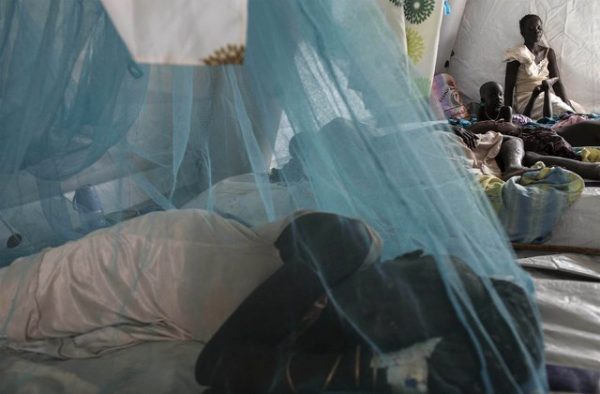THE WORLD IS WINNING the war against malaria, but public health leaders say they won’t stop battling until the disease has been eradicated. On Wednesday, many came together in Washington to celebrate their successes against the mosquito-borne disease and to continue the push to fight it.
“We must remember that the battle with our common enemy, malaria, is not yet won,” said Alfonso Lenhardt, acting administrator of the U.S. Agency for International Development.
“Keep those three points coming – it saves lives,” Retired Navy Rear Adm. Timothy Ziemer, U.S. global malaria coordinator for the President’s Malaria Initiative, told Curry.
The nets, which cost $10 each, are one of the most common and effective strategies for fighting malaria. The disease, which is treatable and can be diagnosed through a blood test, is spread when someone is bitten by a mosquito carrying it. Symptoms are similar to those of Ebola and include chills, flu-like symptoms, fever, vomiting, diarrhea and yellowing of the skin and eyes. The illness can be life-threatening, but also can be prevented and treated with drugs.
The U.S. has been actively engaged in anti-malaria efforts for at least a decade, since President George W. Bush first launched the President’s Malaria Initiative. The program is continuing its push under President Barack Obama, calling to lower malaria mortality by a third by 2020 and to eradicate the disease between 2040 and 2050.
“It was bipartisan from the very first moment; it belongs as much to President Obama as to President Bush,” said Kent Hill, senior vice president for international programs at World Vision, a Christian organization that’s part of the anti-malaria collaboration.
The efforts have made significant headway. Since 2000, malaria mortality rates have decreased worldwide by 47 percent and by 54 percent in Africa alone, where 9 in 10 malaria deaths occur, according to the World Malaria Report. Nothing But Nets estimates that 4.3 million malaria-related deaths have been averted between 2001 and 2013 – 95 percent of which are estimated to be in children under 5 in Africa, who have the highest chance of becoming infected.
“No public health program funded by the U.S. government has had such a great impact in such a short period of time,” Dr. David Brandling-Bennett, senior adviser for malaria initiatives at the Bill and Melinda Gates Foundation, said at the event.
“When someone of his stature and reputation steps up and not only articulates the problem of malaria but then provides time and resources … it sends a resounding message,” he said.
Curry, who has visited countries in Africa to distribute nets, has been involved in the project since his time at Davidson College, when his roommate, teammate and best friend Bryant Barr introduced him to the cause.
“It has been pretty amazing to see where we are and the lives we are impacting,” he said.
Curry also said being a new parent has impacted how he views the project. “As a parent you want to protect your child,” he said. “That hit home for me.”
Despite the progress, dangers persist. Nearly half of the world’s population is still at risk of malaria infection, according to the U.N., and a child dies every minute from the disease. Better tracking is needed “to understand where problems are and intervene faster,” said Dr. Tom Frieden, director of the Centers for Disease Control and Prevention.
“We know that poverty drives instability,” he says. “There’s a reason why the National Security Council is interested in malaria. They see these public health threats as security issues for the U.S.”
When a child is protected against malaria, Nahlen said, he or she is less likely to die of other diseases as well.
“Malaria is one of the best return on investments in world health,” he said.
In December, the World Health Organization reported that the outbreak of Ebola – which swept mainly through Guinea, Liberia and Sierra Leone, killing more than 9,500 people – affected the progress of combating malaria.
“It definitely set us back a bit,” Barat says. “People were afraid to come to health facilities when they were sick. I think we believe that [the] malaria burden probably did worsen in those countries.”
Because the early symptoms of both diseases are identical, sometimes patients who had malaria were placed with patients who had Ebola, he says, meaning malaria patients could have gotten the other disease as well.
“The recent – and ongoing – Ebola crisis has taught us nothing if not that diseases do not operate in vacuums, and we can no longer continue investing in them as if they do,” said Dr. Fatoumata Nafo-Traoré, executive director of the Roll Back Malaria Partnership.
Said Brandling-Bennett: “Elimination is necessary, and there really is no alternative.”

